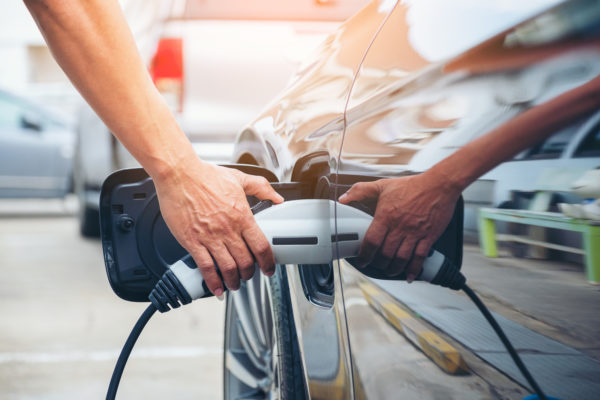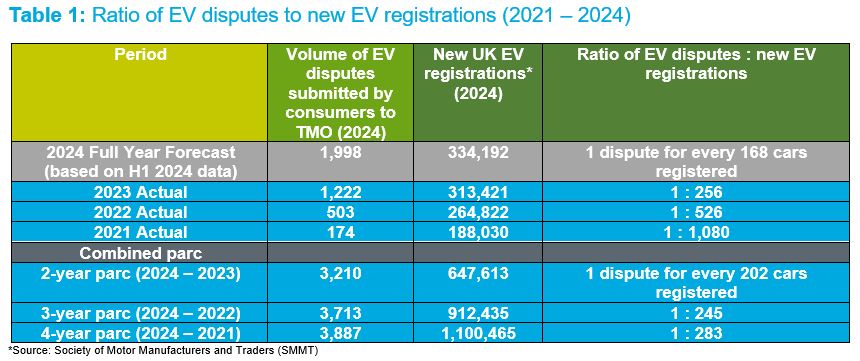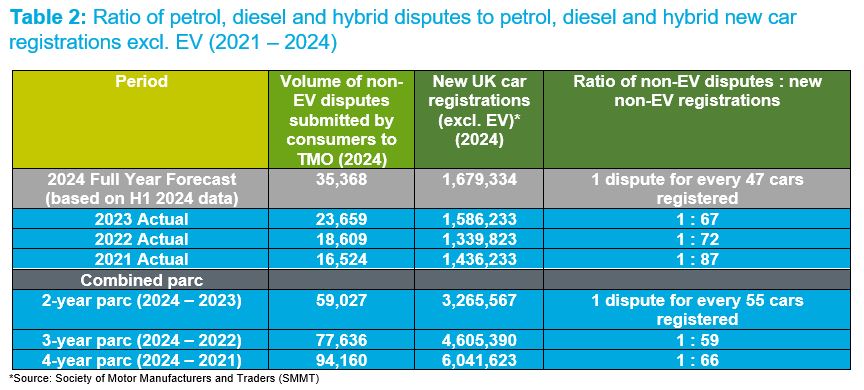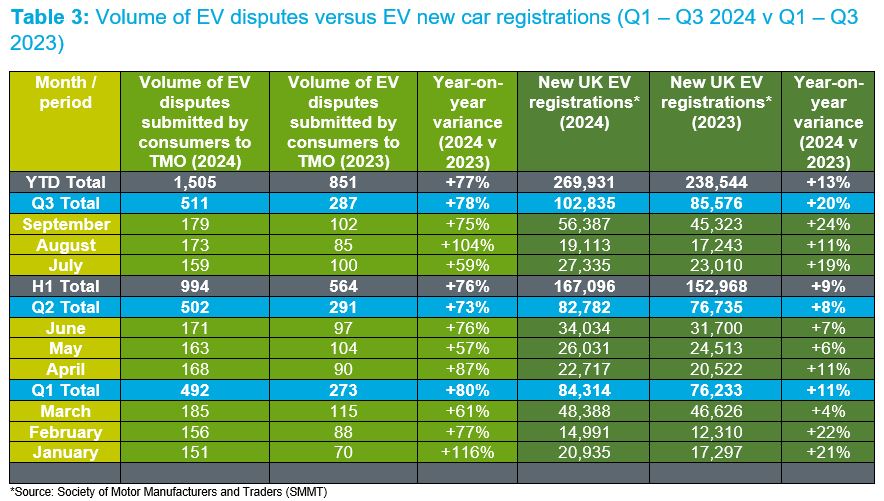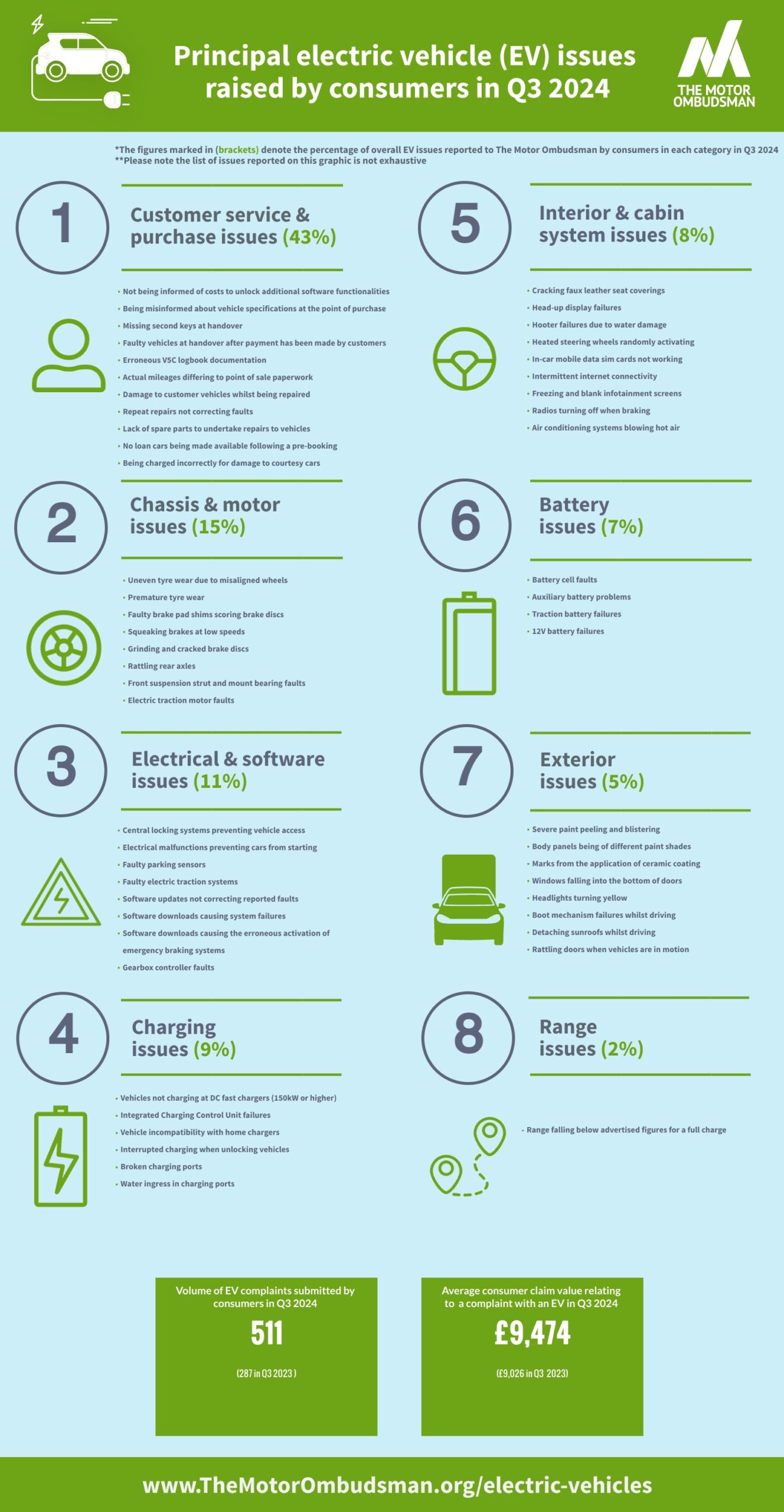EV disputes brought by consumers to The Motor Ombudsman in Q3 2024
Overview of EV disputes brought to The Motor Ombudsman relative to UK new car registrations and the car parc
Before looking at the profile and volume of electric vehicle (EV) disputes received by The Motor Ombudsman from consumers during the previous quarter, it is important to understand the trend of EV disputes in relation to both EV and non-EV new car registrations (i.e. petrol, diesel and hybrid models), and the overall EV and non-EV parc.
When looking at disputes on an annual basis, and the four-year car parc in Tables 1 and 2 below, it is possible to conclude that EVs generate far fewer complaints per vehicle than non-EV equivalents. This can be illustrated by the fact that, when based on the four-year parc (including an estimated full-year forecast for 2024 based on H1 data), if 6,041,623 new EVs were to be registered, they would only be subject to 21,339 disputes, compared to 94,160 for non-EVs (i.e. petrol, diesel, and hybrid models), thereby highlighting the lower proportion of disputes for EVs overall versus their combustion-engined counterparts.
Overview of EV disputes received in Q3 2024
Consumers brought a total of 511 battery electric vehicle (EV) complaints to The Motor Ombudsman (TMO) in the third quarter, the highest ever number of EV-related disputes logged with The Motor Ombudsman in a single quarter.
Over 1,500 EV disputes have been recorded by The Motor Ombudsman for the first nine months of 2024, which is nearly double the volume seen at the same point last year (851) – see Table 3. Furthermore, the volume of disputes reported in Q3 equates to a 78% rise versus the number recorded between 01 July and 30 September 2024 (287).
The relative rise in disputes mirrors the growing parc and EV new car registrations in the UK during the past 12 months (as seen in the table below), and a greater proportion of disputes relating to used examples versus brand new models.
When looking at the main issues encountered by consumers with an EV during the third quarter of 2024, they are as follows:
1. Customer service and purchase issues (43%)
Issues around the customer service experience delivered by a business accounted for the largest number of complaints submitted to The Motor Ombudsman in relation to EVs during the third quarter of this year. At the point of sale, consumers logged disputes about being misinformed about vehicle specifications, and unforeseen costs in relation to unlocking additional software functionalities.
Similarly, at the handover of vehicles, consumers reported faulty cars, inaccurate paperwork, and actual mileages differing to those stated as part of the purchase process.
From a maintenance perspective, concerns raised by EV owners included, cars being damaged whilst in the care of a business, repeat repairs not correcting faults, and courtesy vehicles not being provided during work, despite customers booking one ahead of time.
2. Chassis and motor issues (15%)
During Q3, there were encouragingly fewer issues reported in regards to this area of an EV, versus what was seen during the first two quarters of 2024, namely 16% in Q1, and 18% in Q2. Concerns raised in consumer submissions to The Motor Ombudsman, counted premature tyre wear in respect to the low mileage that had been driven, and squeaking, grinding, and cracked brake discs.
3. Electrical and software issues (11%)
EVs are heavily reliant on electrical and software systems, and when failures occur, this can prevent usage of a vehicle. Some of the notable problems highlighted by EV owners during the past three months, were software downloads causing system faults, and not resolving others, electrical malfunctions preventing access to vehicles and from them starting, as well as faulty parking sensors and electric traction systems.
4. Charging issues (9%)
Charging concerns made up just under 10% of the EV-related disputes logged with The Motor Ombudsman between 01 July to 30 September this year. Vehicle incompatibility with home and DC fast chargers prevented the replenishment of batteries, whilst broken and water ingress in charging ports were also a source of frustration for consumers.
5. Interior and cabin systems issues issues (8%)
Interior issues stayed at a similar level during the third quarter of the year compared to what was seen in the first two quarters of this year (8% in Q1 and 10% in Q2 respectively). Disputes were driven by the likes of infotainment screens going blank, vehicles having intermittent internet connectivity, and in-car sim cards not functioning. Other complaints mentioned cracking seat coverings, and air conditioning systems emitting hot air.
6. Battery issues (7%)
The fifth highest volume of EV complaints in Q3 stemmed from batteries, with faults occurring with individual cells, in addition to auxiliary, traction, and 12V batteries causing problems for car owners.
7. Exterior issues (5%)
Complaints about an EV’s bodywork and exterior fixtures decreased slightly in comparison to the volume reported in the second quarter of this year. Areas of concern on panels themselves, as stated by EV drivers in their case files, were namely about the quality of paint finishes and its appearance. In terms of individual components, consumers reported headlamp coverings turning yellow, as well as boot mechanisms and sunroofs failing whilst driving, posing hazards to owners.
8. Range issues (2%)
Mirroring the overall trend with EV-related complaints seen by The Motor Ombudsman on a quarterly basis, range issues made up the smallest proportion of complaints. These were primarily centred around the fact that consumers did not achieve the advertised figure on a full charge. Range concerns typically spike during colder periods of the year, meaning Q4 may therefore see a slight uplift in these kinds of disputes, as autumn and winter set in.
Average consumer claim value
For consumers who stated a monetary value to resolve their complaint with a business, the average stood at £9,474 for the past three months, up 5% from the figure of £9,026 seen during Q3 2023.
To view and download the infographic below as a PDF, please click here.
To view and download The Motor Ombudsman’s thought leadership paper on electric vehicle disputes as a PDF, please click here.


